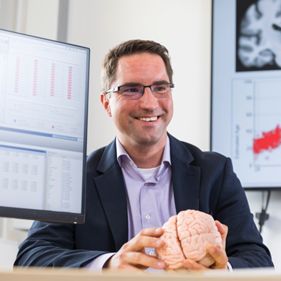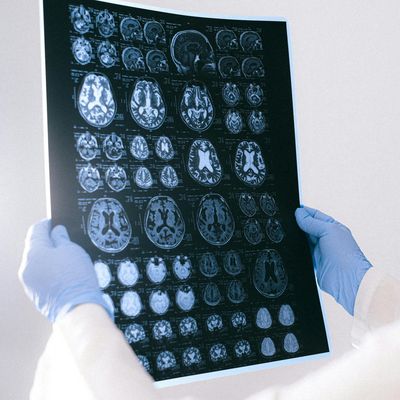When AI reads your mind: What can a brain scan reveal?

Artificial intelligence makes it possible to recognize character traits and mental illnesses from brain scans. This promises progress in medicine, but also raises serious ethical questions: How do we enable its use and prevent misuse at the same time?
A guest article by Prof. Simon Eickhoff and Anna Geiger - Institute of Neuroscience and Medicine: Brain and Behavior (INM-7) at Forschungszentrum Jülich.
Our thoughts, feelings and beliefs make us unique as human beings. They shape our identity and influence our behavior and decisions. Until now, it was also considered certain that we can only look in front of each other's heads, but not inside them. But this certainty is increasingly being shaken.
Smartphones collect comprehensive information about movement patterns, sleep patterns, cell phone use, interests and other behaviors, unnoticed by many. With the help of algorithms, it is already possible to use this data to draw numerous conclusions about a person: For example, movement patterns and sleeping patterns provide clues about a person's energy levels and stress resistance. Cell phone use also allows conclusions to be drawn about their social interactions and communication behavior. And in future, with the help of artificial intelligence, it should be possible to extend such analyses even further - for example to make statements about personality traits or mental illness.
Algorithms already make it possible to detect Alzheimer's disease.

Prof. Simon Eickhoff
Prof. Dr. Simon B. Eickhoff
Prof. Dr. Simon B. Eickhoff is the director of the Institute of Neuroscience and Medicine (INM-7; Brain and Behaviour) at the Forschungszentrum Jülich and the director of the Institute of Systems Neuroscience at the Heinrich-Heine University Düsseldorf. Working at the interface between neuroanatomy, data-science and brain medicine, Simon Eickhoff is a leading expert in data-intense neuroscientific research through artificial intelligence and high-performance computing.
He develops, implements and applies innovative approaches to large neuroimaging datasets for modelling of inter-individual variability in the human brain as well as its changes during development and aging, and clinical translation into novel diagnostic and prognostic algorithms. This goal is pursued by the development and application of novel analysis tools and approaches for large-scale, multi-modal analysis of brain structure, function and connectivity as well as by machine-learning for single subject prediction of cognitive and socio-affective traits and ultimately precision medicine.
In science, brain scans from magnetic resonance imaging (MRI) have also been used with increasing success in recent years to explore a person's thoughts and behavior. Supported by artificial intelligence (AI) methods, which we have also been developing at Forschungszentrum Jülich for several years, it should become possible to measure various characteristics and traits directly and objectively.
What drives us to do this? AI offers many potential applications, especially in medicine: Using algorithms that are able to understand complex patterns and correlations, it is already possible to detect Alzheimer's disease. And there is a good chance that in future, diseases such as Parkinson's, schizophrenia or depression can be diagnosed at an early stage using MRI scans before they have a lasting impact on the lives of those affected. In the future, we will probably also be able to use AI to predict how individual patients will react to certain medications or therapies.
Furthermore, in some areas of society, there is a strong interest in subjective assessments of other people: Judges, for example, need to assess whether a criminal has actually changed during their imprisonment. Psychologists have to correctly assess a patient's complaints.
Until now, psychologists and experts have conducted interviews and various tests to classify people. However, the interviewees have to cooperate and the opinion of the assessor can influence the result. In addition, the interviewees try to obtain a positive assessment by embellishing their answers. This approach therefore undoubtedly has weaknesses.
Scientists have already been able to predict age, gender and personality traits.

Anna Geiger
Anna Geiger, Forschungszentrum Jülich
Anna Geiger hat Neuropsychologie an der Universität Maastricht studiert und arbeitet seit 2018 als wissenschaftliche Koordinatorin am Institut für Neurowissenschaften und Medizin (INM-7; Gehirn und Verhalten) im Forschungszentrum Jülich. Sie fungiert hier als Schnittstelle zwischen Administration und Wissenschaft, übernimmt Koordinations- und Managementaufgaben und ist im Bereich der Wissenschaftskommunikation tätig.

In the search for a new method of objectively predicting personal characteristics, we began predicting individual characteristics using artificial intelligence at our Brain and Behavior Institute seven years ago.
To do this, we first feed an algorithm with the brain scans of a very large number of people, as well as with information about the gender of the respective test subjects. “Gender” is used here as an example of the characteristic that is ultimately to be predicted. However, this could also be age, a certain personality trait or a person's preferred taste in music. Next, we train the algorithm to find patterns and correlations between the image data and the gender of the person.
For example, the algorithm should learn to predict a person's gender based solely on their brain scan. In the next step, we feed the algorithm with the brain scans of new, previously unknown test subjects to check whether this works without errors. These will then be used to predict gender. If this does not yet work well, i.e. the gender is not correctly determined in some cases, we continue to adapt the algorithm. This allows us to improve the accuracy of the algorithm. Using this method, scientists at our institute have already been able to successfully predict the age, gender and certain personality traits such as extraversion, neuroticism, agreeableness and openness of unknown people with a high degree of precision. This makes it increasingly possible to look inside people's heads.
There are important legal and ethical questions and concerns that need to be taken seriously and discussed openly before AI-supported evaluations can be used in public areas.
For many people, this should not only cause fascination, but also goose bumps. Of course, there is also the threat of potential misuse - by health insurance companies, for example. They could use their customers' health data to create detailed risk profiles, for example for mental illnesses. If misused, these risk profiles could be used by insurance companies to increase premiums, refuse benefits if a pre-existing condition is suspected or even reject insurance applications.
There are therefore important legal and ethical questions and concerns that need to be taken seriously and discussed openly before AI-supported evaluations can be used in public areas. A key question here is how the privacy and autonomy of individuals can be safeguarded. There is currently a lack of concrete regulations on the circumstances and extent to which access to personal data for such purposes is justified.
Based on an old MRI scan, it may be possible to predict things that the person concerned has never thought about.
Laws must also be created to ensure data protection and data security. The question of responsibility in the event of misjudgements or wrong decisions by algorithms must be clarified. Furthermore, it is important that people fully understand in advance what data is collected and how it is used before they give their consent. Because on the basis of an old MRI scan of the brain that was taken at some point due to a specific illness, it may be possible in future to predict things that the person concerned never thought about.
We are therefore calling on politicians, ethics committees and civil society to consider whether and to what extent access to personal data is justified and what measures need to be taken to prevent misuse. To support this, staff at our institute have been developing an assessment framework for the use of medical AI since 2021, which includes ethical and legal aspects and takes into account the expectations of both doctors and patients who are directly affected by the use of this new technology. (Read more in this article.)
Used correctly, AI can help improve quality of life
There are many good reasons why the effort is worthwhile. The methods, trained on countless data sets, detect even the most subtle abnormalities in brain scans, far beyond the capabilities of the human eye. By understanding the unique characteristics of a brain and correlating these with people's individual traits, customized treatment plans can be created for patients. These promise to be more effective and efficient. In this way, AI not only contributes to improving treatment outcomes, but also to enhancing people's quality of life.









